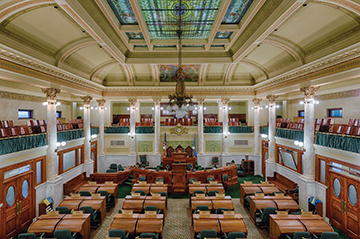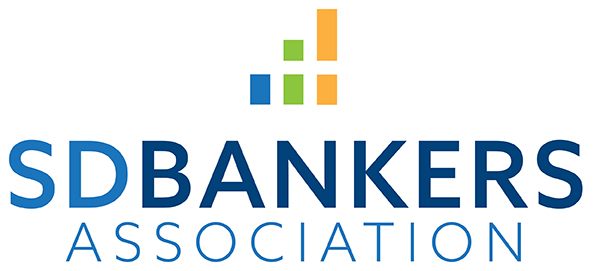- Education & Events
- Advocacy
- Products & Services
- Membership
- Resources
- SDBANKER Magazine
- SDBA eNews
- SDBA eNews Archives
- Legislative Update/Bill Watch
- South Dakota Bank Directory
- Women in Banking
- Scenes of South Dakota Calendar*
- Holiday Signs
- Regulatory Report
- South Dakota Banking Code
- Record Retention Manual
- Advertising & Sponsorship Guide
- COVID-19 Resources
- Mental Health and Crisis Prevention
- About
|
Your Support Needed: Engage in Hot Topic Banking Issues in Pierre Next Week
All bankers are encouraged to attend the SDBA State Legislature next Wednesday at the Ramkota Hotel & Conference Center. The day-long event will include an SDBA Legislative Committee meeting, lunch, SDBA update, featured speaker Keith Prather, Gov. Kristi Noem, and the chance to visit with state legislators at the State Capitol. The day will also include special sessions specifically designed for emerging bank leaders and an evening reception with state legislators and constitutional officers. Learn more and register to attend. SDBA Seeking Candidates for Vice Chair
The current chair-elect, David Bangasser (Dacotah Bank, Sioux Falls), will automatically assume the chair position on June 15. The current vice chair, David Nelson (First Fidelity Bank, Burke), will be eligible to run for chair-elect. The position of vice chair will be up for election. Current Chair Kristina Schaefer (First Bank & Trust, Sioux Falls) will become immediate past chair. If you are an executive officer of any SDBA member bank, you are eligible to run for vice chair. If you are interested in running for the position, contact a member of the nominating committee prior to the NDBA/SDBA Annual Convention and submit a letter of intent to SDBA President Karlton Adam at [email protected] or by mail to SDBA, PO Box 1081, Pierre, SD 57501. View Officer Election Nominating Committee.
ABA Analysis: Fed Paper Highlights Potential CBDC Effects on Bank DepositsThe Federal Reserve’s recently released paper on central bank digital currencies confirmed that a CBDC would compete with banks for deposits, according to a members-only staff analysis published by ABA. “The Fed recognizes that a CBDC will serve as an advantaged competitor to bank deposits, noting that a ‘CBDC would be the safest digital asset available to the general public, with no associated credit or liquidity risk,’” ABA noted. “Because a CBDC would be a liability of the Federal Reserve, any funds held in CBDC would not reside on bank balance sheets or be available as a source of funds for lending back into the economy. The Fed notes that, ‘this substitution effect could reduce the aggregate amount of deposits in the banking system, which could in turn increase bank funding expenses and reduce credit availability or raise credit costs for households and businesses.’” While the paper claimed not to advance a particular outcome, the Fed demonstrated a clear preference for a “privacy-protected, intermediated, widely available and identity-verified” CBDC, the ABA analysis highlighted. Importantly, the Fed signaled that it does not intend to move forward with a CBDC without clear support from the executive branch and from Congress, ideally in the form of a specific authorizing law.” The paper also clarified that the Fed does not currently have the authority to offer direct Fed accounts to individuals. ABA has previously weighed in on the risks associated with issuing a CBDC, warning that the issuance of a CBDC could compete with bank deposits and limit banks’ ability to power economic growth. ABA is currently reviewing the paper and will provide feedback to the Fed. To provide feedback for ABA’s comments or join the association’s digital asset working group, contact Rob Morgan. Read the staff analysis SEC Reopens Comment Period for Executive Compensation Disclosure RequirementsThe Securities and Exchange Commission last Thursday reopened a comment period on a proposed rule requiring new disclosures concerning companies’ executive compensation. The rule—which was originally proposed in 2015 but never finalized—would require a reporting company’s proxy statement and other disclosures to include a table showing actual compensation paid to key executives; the company’s annual total shareholder return, as calculated under SEC Regulation S-K; and the annual total shareholder returns of a peer group of companies. Under the proposed rule, the reporting company would be required to discuss the relationships among the disclosed compensation numbers, its total shareholder return and the comparable peer group information. The disclosures would be required for the past five fiscal years, or three years for smaller companies, which would also be exempt from the peer group comparison requirement. All reporting companies would be subject to the new disclosures, except foreign private issuers and certain specialized entities such as mutual funds. The disclosure requirements would apply to the “named executive officers” for whom compensation information is currently required. As part of its request for comments, the SEC is also seeking feedback on additional requirements it is considering including: whether registrants should be required to disclose additional performance measures beyond shareholder return and whether pre-tax net income and net income would be useful financial measures, among other things. Comments will be due 30 days after publication in the Federal Register. This proposal is separate from a joint proposal (not yet adopted) that was issued by six federal financial regulatory agencies in 2016 that would prohibit incentive-based compensation arrangements for executives that could encourage excessive risk-taking behavior, which also included a clawback provision. Read more. For more information, contact ABA’s Justin Underwood. Podcast: Exit Interview with Jelena McWilliamsAs Jelena McWilliams prepares to leave office tomorrow after an eventful three and a half years as FDIC chairman, she sat down with the ABA Banking Journal for a conversation on her tenure at the agency. While 2018 wasn’t that long ago, it feels worlds away—in terms of the time-is-a-flat-circle nature of the pandemic, but also in the landscape of bank innovation and racial justice. In the final part of this two-part interview, McWilliams discusses several policy aspects of her tenure, including:
Profile: Jelena McWilliams on Her Legacy at the FDICComplementing the two-part podcast is a profile of McWilliams as she prepares to leave office after an eventful three and a half years as chairman. The profile covers FDIC achievements in financial inclusion, bank innovation, supporting minority banks and regulatory cooperation during McWilliams’ tenure. Read the article. FDIC Expands Campaign to Promote Bank AccountsThe FDIC yesterday expanded its public awareness campaign about the benefits of opening a bank account. The campaign now targets the Los Angeles, Dallas and Detroit metro areas, following last year's campaign launch in the Atlanta and Houston areas. The FDIC’s #GetBanked campaign encourages consumers to consider opening a checking account through a series of English and Spanish-language digital, audio and video advertisements. The FDIC said it hopes to reach unbanked consumers especially during the tax filing season when they can benefit from early and direct deposit of their refunds. The campaign also includes resources to help consumers choose the best account to meet their needs and how to find low-cost bank accounts. As the banking industry works to promote financial inclusion, ABA continues to call on all banks to consider offering Bank On-certified accounts that offer low costs, no overdraft fees, robust transaction capabilities via a debit or prepaid card and bill pay capabilities. Read more about the FDIC campaign. Learn more about Bank On.
Rep. McHenry, Sen. Tester to Speak at ABA Washington SummitSen. Jon Tester (D-Mont.) and Rep. Patrick McHenry (R-N.C.) have been added to the speaker lineup for ABA’s Washington Summit, a free in-person and virtual event to be held March 7-9. Tester, a key member of the Senate Banking Committee, will share his thoughts on the committee’s 2022 agenda and the critical issues facing the banking sector. McHenry, the ranking Republican on the House Financial Services Committee, will also offer his perspective on major banking policy issues and his outlook for action in the House in 2022 and beyond. Summit attendees will hear from lawmakers and regulators, as 2022 promises to be a pivotal year for the banking industry—with new leaders now in place at major regulatory agencies, Congress eyeing the midterm elections and the nation's economic recovery still uncertain. All bankers and associate members are encouraged to attend the Washington Summit to learn about major policy issues in play and have their voices heard. Register now for this free event. The SDSBA offers a $500 stipend to help with the travel expenses of one person from each SDBA member bank to attend in person. Stipends will be paid after the event. Questions, contact the SDBA's Halley Lee. Question of the Week
Question: What is the current closed-end threshold for partial exemptions? When does it change? Answer: The partial exemption closed-end threshold is currently 500 transactions in each of the two previous years and is not currently scheduled to change. There is currently a full reporting exemption which is currently set at 100 transactions in either of the two previous years, which increased from 25 transactions on Jan. 1, 2020. (2) ...an insured depository institution or insured credit union that, in each of the two preceding calendar years, originated fewer than 500 closed-end mortgage loans...is not required to collect, record, or report optional data as defined in paragraph (d)(1)(iii) of this section for applications for closed-end mortgage loans that it receives, closed-end mortgage loans that it originates, and closed-end mortgage loans that it purchases. 12 CFR 1003.3(d)(2) – https://www.consumerfinance.gov/rules-policy/regulations/1003/3/#d-2 Effective July 1, 2020, this final rule permanently raises the closed-end coverage threshold from 25 to 100 closed-end mortgage loans in each of the two preceding calendar years. Home Mortgage Disclosure Rule, p. 2 https://files.consumerfinance.gov/f/documents/cfpb_final-rule_home-mortgage-disclosure_regulation-c_2020-04.pdf. Compliance Alliance offers a comprehensive suite of compliance management solutions. To learn how to put them to work for your bank, call 888.353.3933 or email and ask for our Membership Team. For timely compliance updates, subscribe to Bankers Alliance’s email newsletters. SDBA eNews Archive Advertising Opportunity Questions/Comments |


 Issues of importance to the banking industry are surfacing at the South Dakota Legislature, and bankers are needed in Pierre next Wednesday, Feb. 9, to make sure that our industry's voice is heard.
Issues of importance to the banking industry are surfacing at the South Dakota Legislature, and bankers are needed in Pierre next Wednesday, Feb. 9, to make sure that our industry's voice is heard.  Are you interested in becoming an officer of the South Dakota Bankers Association? SDBA officers include the chair, chair-elect, vice chair and immediate past chair. The SDBA is currently seeking people who are interested in running for the vice chair position, which will be elected at the NDBA/SDBA Annual Convention on June 15, 2022, in Bismarck.
Are you interested in becoming an officer of the South Dakota Bankers Association? SDBA officers include the chair, chair-elect, vice chair and immediate past chair. The SDBA is currently seeking people who are interested in running for the vice chair position, which will be elected at the NDBA/SDBA Annual Convention on June 15, 2022, in Bismarck.
